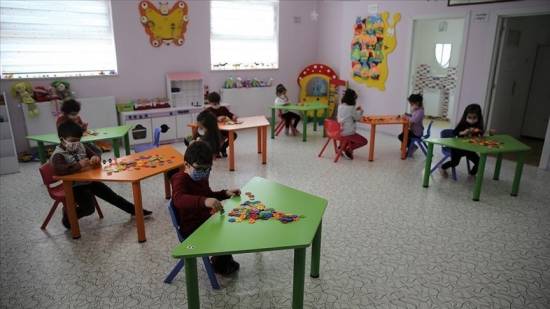COVID-19 has changed the lives of most people around the world, and like adults, children too are being forced to face this new reality.
It is a reality that is hard for some adults and can be even harder for some children to grasp and accept.
With schools and playgrounds being closed and social distancing measures imposed, children cannot mingle with their friends as it is natural to do and isolation prevails.
But what is the most challenging part for kids these days? How is this sudden shift in their daily lives seen by children?
Irene P., an 11-year-old, and her 10-year-old sister Lydia, who both live in Greece, feel uncomfortable having to adjust to this new reality.
“As children, it’s not easy for us to adjust in this new life, as we’re away from our natural environment, which is our school,” said Irene.
“We don’t get the chance to see our friends have fun and play and laugh as kids are supposed to. But it’s also seeing our teachers. It’s different when we’re in class because it’s natural and we get the chance to ask the questions we want,” she added.
“It has affected me a lot, as I don’t have many things to do such as sports like I used to.”
Kids do have the chance to follow their classes online, but they are missing one very important factor that cannot be replaced through home learning: interaction with fellow classmates and friends.
Experts claim that social interaction is an essential skill that children need to learn from a young age, as they are still developing their social skills.
Unfortunately, due to the current situation, children are spending less time with their peers and more time in front of a screen.
Consequently, this can have a serious effect on their cognitive development, clinical psychologist and psychotherapist Thomas Maliaroudakis told Anadolu Agency.
According to Lydia P. who is an elementary school student, “all children are overwhelmed with the situation, as we are forced to attend class through a screen.”
“It’s not the same talking and interacting with friends virtually, as it’s impossible to play and have fun!” she added.
“The outcome of the isolation that children face is the lack of working in groups and learning about teamwork. It is very important for children to learn how to work in teams, as it will follow them throughout their lives,” Maliaroudakis pointed out.
Experts also claim that online home learning can create confusion and frustration as a home environment many times is associated with rest and play.
“School and home have become one,” Maliaroudakis said, adding this is not always an easy thing for a child to distinguish.
Apart from the significant changes in their daily routine, they are forced to face other challenges such as different or no rules during class hours.
An interrupted routine without boundaries and rules can make kids feel confused, he said.
Prior to COVID-19, nine-year-old Katerina L. used to spend her weekends at her grandparents or playing with friends.
Today, she tries hard to adjust to the new reality, as there is a limited amount of activities she can do and therefore she is forced to spend a lot of time in front of a screen.
Grumpiness, irritation, and aggression are some of the feelings that Katerina’s mother Anna G. told Anadolu Agency she has noticed in her daughter’s behavior.
According to Maliaroudakis, “each child has their own personality, and therefore their coping skills and resilience may differ.”
“I haven’t seen my grandparents for a very long time, and I just spend my free time on a computer,” Katerina said. “This makes me very mad.”
“This thing is so bad and I want it to end soon,” she said, referring to the virus.
According to experts, isolation can have a significant impact on a child’s emotional and behavioral health.
Sometimes these emotions can be overwhelming for a child and consequently lead them to feel anxious, depressed, and/or frustrated.
“Situations like these can be very tricky for everybody, including experts in this field, as we have to face challenges that are unfamiliar to us,” Maliaroudakis added./aa


